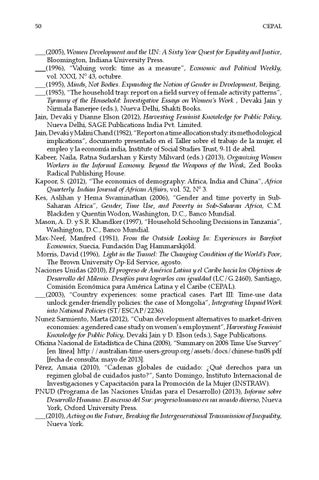50 CEPAL
(2005), Women Development and the UN: A Sixty Year Quest for Equality and Justice, Bloomington, Indiana University Press. (1996), “Valuing work: time as a measure”, Economic and Political Weekly, vol. XXXI, Nº 43, octubre. (1995), Minds, Not Bodies. Expanding the Notion of Gender in Development, Beijing. (1985), “The household trap: report on a field survey of female activity patterns”, Tyranny of the Household: Investigative Essays on Women’s Work , Devaki Jain y Nirmala Banerjee (eds.), Nueva Delhi, Shakti Books. Jain, Devaki y Dianne Elson (2012), Harvesting Feminist Knowledge for Public Policy, Nueva Delhi, SAGE Publications India Pvt. Limited. Jain, Devaki y Malini Chand (1982), “Report on a time allocation study: its methodological implications”, documento presentado en el Taller sobre el trabajo de la mujer, el empleo y la economía india, Institute of Social Studies Trust, 9-11 de abril. Kabeer, Naila, Ratna Sudarshan y Kirsty Milward (eds.) (2013), Organizing Women Workers in the Informal Economy. Beyond the Weapons of the Weak, Zed Books Radical Publishing House. Kapoor, S. (2012), “The economics of demography: Africa, India and China”, Africa Quarterly. Indian Journal of African Affairs, vol. 52, Nº 3. Kes, Aslihan y Hema Swaminathan (2006), “Gender and time poverty in SubSaharan Africa”, Gender, Time Use, and Poverty in Sub-Saharan Africa, C.M. Blackden y Quentin Wodon, Washington, D.C., Banco Mundial. Mason, A. D. y S.R. Khandker (1997), “Household Schooling Decisions in Tanzania”, Washington, D.C., Banco Mundial. Max-Neef, Manfred (1981), From the Outside Looking In: Experiences in Barefoot Economics, Suecia, Fundación Dag Hammarskjöld. Morris, David (1996), Light in the Tunnel: The Changing Condition of the World’s Poor, The Brown University Op-Ed Service, agosto. Naciones Unidas (2010), El progreso de América Latina y el Caribe hacia los Objetivos de Desarrollo del Milenio. Desafíos para lograrlos con igualdad (LC/G.2460), Santiago, Comisión Económica para América Latina y el Caribe (CEPAL). (2003), “Country experiences: some practical cases. Part III: Time-use data unlock gender-friendly policies: the case of Mongolia”, Integrating Unpaid Work into National Policies (ST/ESCAP/2236). Nunez Sarmiento, Marta (2012), “Cuban development alternatives to market-driven economies: a gendered case study on women’s employment”, Harvesting Feminist Knowledge for Public Policy, Devaki Jain y D. Elson (eds.), Sage Publications. Oficina Nacional de Estadística de China (2008), “Summary on 2008 Time Use Survey” [en línea] http://australian-time-users-group.org/assets/docs/chinese-tus08.pdf [fecha de consulta: mayo de 2013]. Pérez, Amaia (2010), “Cadenas globales de cuidado: ¿Qué derechos para un regimen global de cuidados justo?”, Santo Domingo, Instituto Internacional de Investigaciones y Capacitación para la Promoción de la Mujer (INSTRAW). PNUD (Programa de las Naciones Unidas para el Desarrollo) (2013), Informe sobre Desarrollo Humano. El ascenso del Sur: progreso humano en un mundo diverso, Nueva York, Oxford University Press. (2010), Acting on the Future, Breaking the Intergenerational Transmission of Inequality, Nueva York.
